As a Toyota Camry owner, you know keeping it in good shape is key. The average yearly maintenance cost is about $420. It’s important to set aside money for these costs to keep your Camry running well.
Knowing how much it costs to maintain your Camry helps you plan. This way, you can avoid sudden expenses. Being proactive keeps your car reliable and efficient, making your drives comfortable.
Setting a budget for your Camry’s upkeep is more than saving money. It’s about keeping your car’s value and performance high. With some planning, you can have a worry-free time owning your Camry.
The True Cost of Toyota Camry Ownership
The Toyota Camry is known for its durability. But, the real cost of owning one goes beyond the initial price. It’s important to consider all expenses when looking at the Camry cost of ownership.
Reliability Reputation vs. Actual Expenses
The Toyota Camry is famous for being reliable. But, this reputation might make you overlook the real costs of owning one. Maintenance expenses are a big part of owning a Camry. Costs like oil changes, tire rotations, and brake pad replacements add up over time.
Knowing the difference between reliability and actual costs helps with budgeting. It’s not just about how reliable the Camry is. It’s about the total cost, including Toyota Camry maintenance expenses.
Maintenance as Part of Total Ownership Costs
Buying a Toyota Camry means more than just the initial cost. Ongoing expenses like fuel, insurance, and Camry maintenance budget are also important. Maintenance keeps the car in good shape and its value high.
Breaking down total ownership costs helps Camry owners understand their expenses better. This includes setting a budget for maintenance. This budget can change based on the model year and how you drive.
Average Camry Maintenance Cost by Year
Knowing the average maintenance cost of your Toyota Camry by year is key for budgeting. The cost changes over time, based on mileage, model year, and driving conditions.

First Year Ownership Expenses
The first year of owning a Toyota Camry is usually cheaper. Routine maintenance services like oil changes and tire rotations are the main costs. On average, you’ll spend $100 to $300 in the first year.
Years 2-5 Maintenance Costs
As the Camry gets older, maintenance costs go up. Between years 2 and 5, you might need to replace brake pads and air filters. The average annual cost is $300 to $500. Regular servicing helps avoid expensive repairs later.
Long-Term Ownership Expenses
Long-term ownership brings higher costs, after the warranty ends. Around 60,000 to 100,000 miles, you might need to replace the timing belt or battery. Budget for higher costs, averaging $500 to $700 a year, as your Camry gets older.
- First-year maintenance costs: $100-$300
- Years 2-5 maintenance costs: $300-$500 annually
- Long-term maintenance costs: $500-$700 per year
By knowing these patterns, Toyota Camry owners can plan better for future maintenance. This helps keep their vehicle in top shape.
Routine Maintenance Services and Their Prices
To keep your Toyota Camry running smoothly, knowing the costs of routine maintenance is key. Regular maintenance keeps your vehicle efficient and prevents expensive repairs later.
Oil Changes and Fluid Services
Oil changes are vital for your Camry. Prices vary based on oil type, conventional or synthetic.
Conventional vs. Synthetic Oil Cost Difference
Conventional oil changes cost $30 to $50. Synthetic oil changes are $60 to $100. Synthetic oil protects your engine better and can save on fuel.
Recommended Oil Change Intervals
Change your Camry’s oil every 5,000 to 7,500 miles. Regular oil changes extend your engine’s life.
Filter Replacements
Replacing filters is another key maintenance task. This includes air, cabin, and fuel filters.
Air, Cabin, and Fuel Filters
- Air filters cost $15 to $30 and need replacing every 15,000 to 30,000 miles.
- Cabin filters, which clean the air inside, cost $10 to $25 and should be replaced every 15,000 miles.
- Fuel filters, important for the fuel system, cost $5 to $15 and are replaced during major services.
When Each Filter Needs Replacement
Filter replacement intervals depend on driving conditions. For example, dusty conditions may require more frequent changes.
Tire Rotation and Replacement
Tire rotation is essential for even wear. Tire rotation costs range from $20 to $50 every 5,000 to 7,500 miles. Replacement costs vary based on tire type and quality.
Brake System Maintenance
Brake maintenance is critical for safety. Brake pad replacements cost $100 to $300 per axle, depending on the type.
Understanding routine maintenance services and their costs helps Camry owners budget for upkeep. This ensures their vehicle remains reliable and safe.
Scheduled Maintenance Timeline for Toyota Camry
Knowing when to service your Toyota Camry is key to keeping it running well. Regular checks prevent big problems and keep your car efficient.
5,000-Mile Service Intervals
The Toyota Camry needs services every 5,000 miles. At this time, you’ll get:
- Oil change
- Tire rotation
- Fluid checks (brake, coolant, transmission)
- Brake pad inspection
These steps are vital for your Camry’s health and spotting issues early.
Major Service Milestones (30k, 60k, 90k miles)
As your Camry gets older, some services become more important. At 30,000, 60,000, and 90,000 miles, you might need:
- Spark plug replacement
- Air filter replacement
- Serpentine belt inspection/replacement
- Transmission fluid change
These services keep your car running smoothly and avoid expensive fixes later.
Timing Belt/Chain Considerations
For some Toyota Camry models, the timing belt or chain is a big deal. Modern Camrys often have timing chains that last forever. But some models might need a timing belt replacement at 90,000 miles. Always check your owner’s manual or talk to a mechanic to see what your car needs.
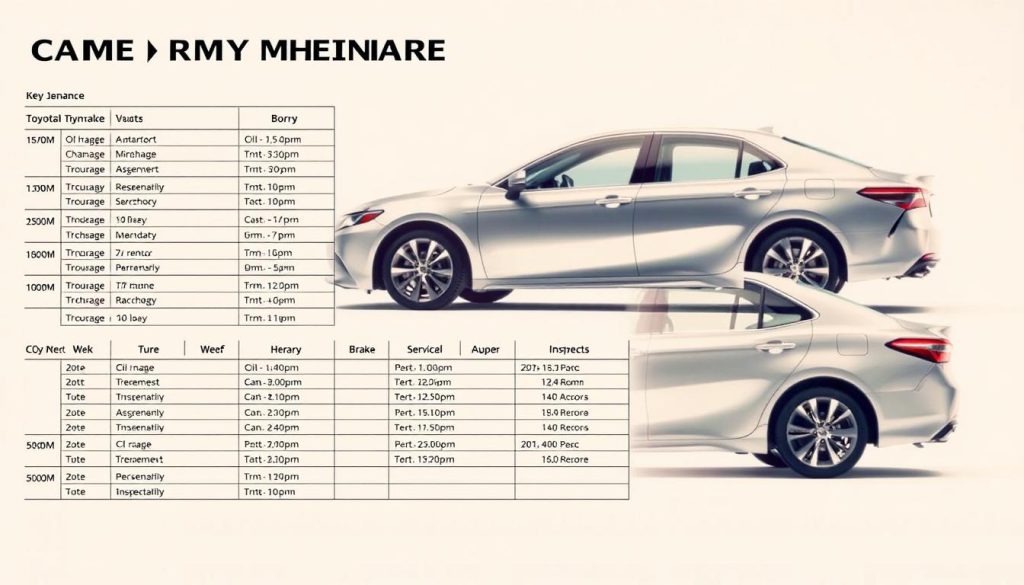
Following the recommended maintenance schedule keeps your Toyota Camry in top shape. It helps your car stay valuable and reliable for years.
Camry Maintenance Costs by Model Year
Knowing how much it costs to keep your Toyota Camry running is key to planning your budget. The cost can change a lot based on when your car was made. Newer cars usually cost less to maintain because they have fewer problems and are often under warranty.
Latest Generation (2018-Present) Maintenance Expenses
The Camry from 2018 on has modern tech and design, leading to lower upkeep costs. Routine services like oil changes and tire rotations are affordable, costing between $50 and $200. Plus, these cars are covered by warranty, which helps with repairs.
- Oil changes: $50-$75
- Tire rotations: $20-$50
- Brake pad replacements: $150-$300
Previous Generation (2012-2017) Service Costs
Camry models from 2012 to 2017 see costs go up as warranties end and parts wear out. Regular maintenance is essential, with oil changes and filter swaps needed often. Expect to spend more on repairs as parts get older.

Older Camry Models (2007-2011) Upkeep
Camry models from 2007 to 2011 need more care and can cost more to fix. Parts wear out faster, leading to issues like transmission problems and engine wear. This means more money for upkeep.
Common repairs include:
- Transmission repairs
- Engine component replacements
- Suspension system maintenance
Classic Camry (Pre-2007) Maintenance Considerations
Camry models from before 2007 come with their own set of challenges. Finding parts can be tough, and repairs might cost more due to the car’s complexity. Owners should plan for more frequent checks and fixes.
By knowing these details, Camry owners can plan better for their car’s maintenance costs based on its model year.
Hybrid vs. Conventional Camry Maintenance Costs
Choosing between a hybrid and conventional Camry affects more than just fuel use. It also impacts maintenance costs. Both types need similar maintenance, but hybrids have unique needs.
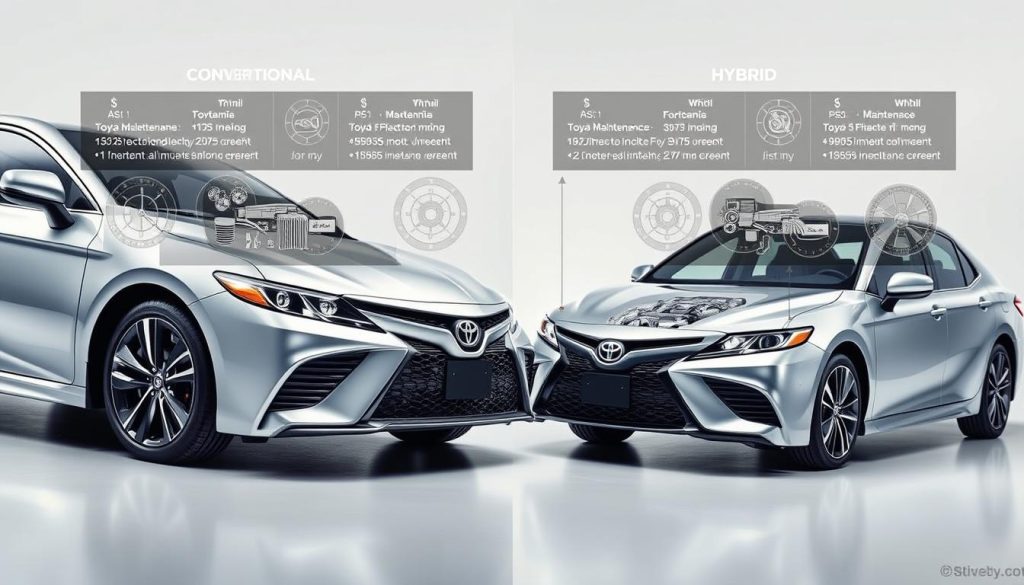
Unique Hybrid System Maintenance Requirements
Hybrid Camrys have complex powertrains with both an engine and electric motor. This makes hybrid system maintenance more complex and possibly pricier. Yet, Toyota’s hybrids are built to last, with many parts covered for up to 8 years or 100,000 miles.
Hybrid Camrys require special care, like checking and possibly replacing parts like the inverter and electric motor. While these parts are usually reliable, fixing them can be costly.
Battery Maintenance and Replacement Costs
Hybrid owners worry about battery replacement costs. But, most hybrid Camry batteries are made to last a vehicle’s lifetime, with an 8 to 10 year guarantee. When they do need replacing, it can cost between $2,000 to $4,000. Yet, as technology advances, prices are dropping.
Long-Term Cost Comparison
Looking at long-term maintenance costs, hybrids and conventional Camrys have different expenses. Hybrids might cost more upfront and have pricier repairs for their systems. Yet, they often save on fuel costs and might have lower maintenance costs for brakes due to regenerative braking.
In the end, the maintenance cost difference between hybrids and conventional Camrys might not be as big as other factors like fuel efficiency. Owners should think about their driving habits, budget, and what matters most to them when choosing a model.
Common Repairs and Their Average Costs
Knowing about common repairs and their costs is key for Toyota Camry owners. This helps them plan their budgets better. Even though the Camry is reliable, some repairs can be needed, affecting your maintenance costs.
Engine-Related Repairs
Engine repairs can be pricey, but knowing what might happen helps. Common issues include water pump replacement and timing belt/chain service.
Water Pump Replacement
The water pump keeps coolant flowing through the engine. If it fails, the engine might overheat, causing damage. Replacing the water pump in a Toyota Camry costs between $300 and $600, including parts and labor.
Timing Belt/Chain Service
The timing belt or chain keeps the engine’s crankshaft and camshaft in sync. Not replacing it on time can damage the engine. The cost for this service is $500 to $1,000, depending on the type and labor rates.
Transmission Issues and Solutions
Transmission problems can cause slipping, hesitation, or not engaging gears right. Fixing or replacing a transmission in a Toyota Camry can cost from $1,000 to $3,000 or more. This depends on the problem and whether a rebuild or replacement is needed.
Electrical System Repairs
Electrical system faults can cause many issues, from minor problems like a broken infotainment system to serious issues like a faulty alternator. Repair costs vary, from $100 for simple fixes to $1,000 or more for complex issues.
Suspension and Steering Components
Worn-out suspension and steering parts can affect the Camry’s handling and safety. Common repairs include replacing shock absorbers, struts, and ball joints. These repairs can cost from $200 to $1,000 or more per part, depending on the specific parts and labor.
Here’s a summary table to help you understand the average costs of these repairs:
| Repair Type | Average Cost |
|---|---|
| Water Pump Replacement | $300-$600 |
| Timing Belt/Chain Service | $500-$1,000 |
| Transmission Repair/Replacement | $1,000-$3,000+ |
| Electrical System Repairs | $100-$1,000+ |
| Suspension/Steering Component Replacement | $200-$1,000+ |
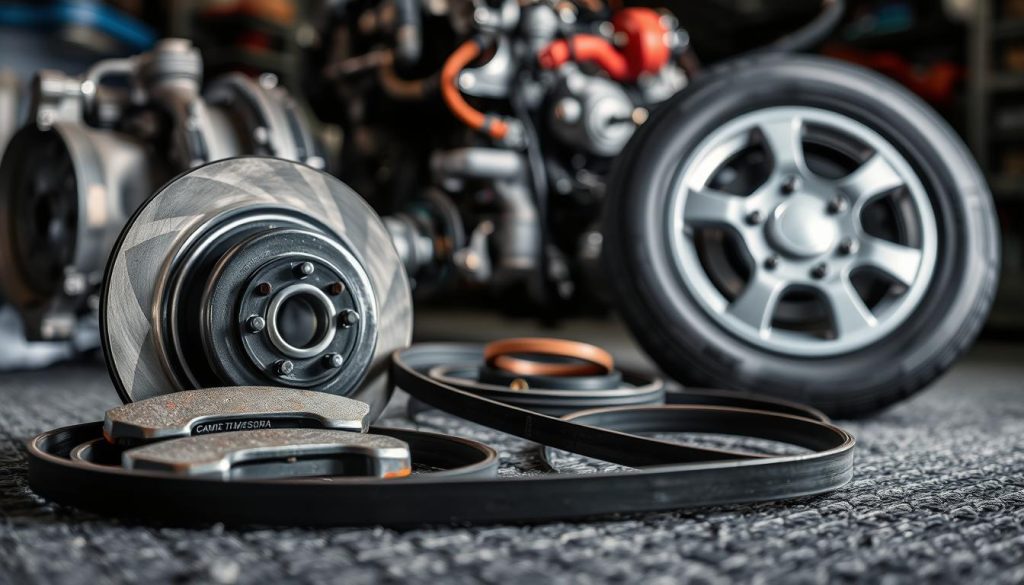
Dealer vs. Independent Shop Maintenance Pricing
Choosing where to get your Toyota Camry serviced is a big decision. Dealer service centers and independent shops have their own pros and cons, mainly in pricing.
Dealer service centers usually cost more than independent shops for Camry maintenance. But there are good reasons for this.

Pros and Cons of Dealer Service
Dealerships have some benefits:
- Factory-trained technicians know your Camry well
- They use genuine Toyota parts
- Repairs may be covered by warranty (if applicable)
- They have the latest equipment and software
But these perks come with a higher price tag. Dealerships often charge more for labor and might suggest extra services.
Finding Reliable Independent Toyota Specialists
To find a reliable independent shop, consider these tips:
- Ask friends or look up online reviews for recommendations
- Make sure they have experience with your Camry model
- Check if they offer a warranty on repairs
- Compare prices for the services you need
By researching, you can find an independent shop that offers quality service at a lower cost. This can help you save on Toyota Camry servicing expenses.
Whether you go to a dealership or an independent shop, knowing the Camry repair costs is key. It helps you make a smart choice and plan your budget.
DIY Maintenance to Save on Camry Upkeep Costs
Camry owners can save money by doing simple maintenance tasks themselves. With basic tools and some knowledge, you can keep your car running well. This way, you can cut down on costs and ensure your vehicle stays in great shape.
Simple Tasks Any Owner Can Perform
Tasks like oil changes, tire rotations, and air filter replacements are easy. You just need basic tools. For instance, an oil change needs a socket wrench, a drain pan, and a new oil filter. Regular oil changes can make your engine last longer.
Tire rotation is another simple task. It ensures your tires wear evenly. You can do it at home with a car jack and lug wrench. Proper tire rotation boosts fuel efficiency and extends tire life.
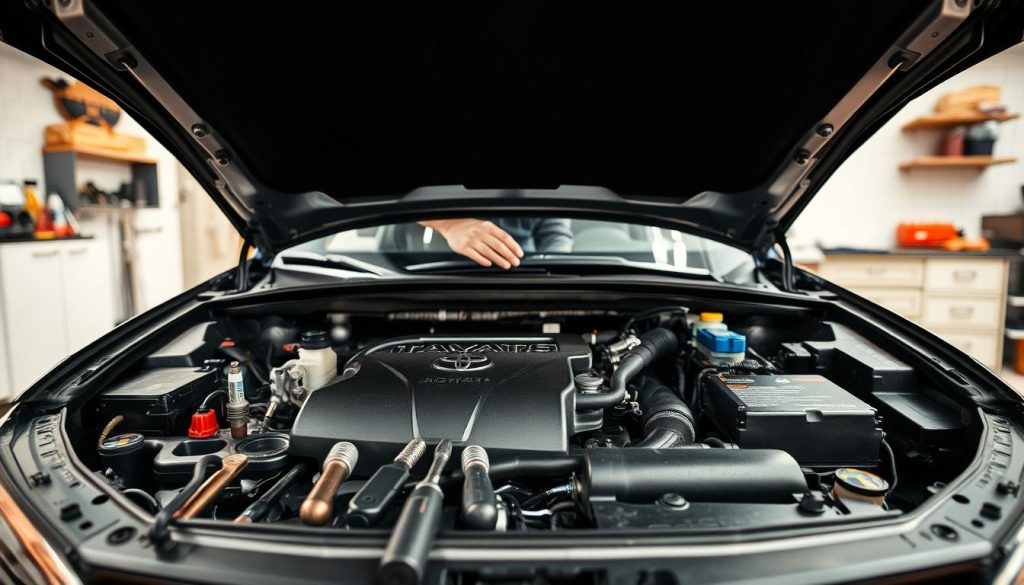
Tools and Resources Needed
To do DIY maintenance, you’ll need basic tools and resources. These include a socket wrench, pliers, screwdrivers, and a car jack. You might also need your owner’s manual or online guides for specific steps. Quality tools make DIY easier and more efficient.
There are also many online tutorials and videos for DIY tasks. They offer step-by-step guides. These resources can boost your confidence and prepare you for DIY tasks.
When to Leave It to the Professionals
While DIY maintenance saves money, some tasks are best left to experts. Complex repairs like transmission work or electrical system checks need special skills and tools. Don’t risk damage by trying tasks you’re not sure about.
If you’re not sure about a task or feel uneasy doing it, get a professional mechanic’s help. They can guide you and ensure the job is done right and safely.
Toyota Warranty Coverage and Its Impact on Maintenance Expenses
Camry owners can greatly benefit from knowing about Toyota’s warranty. It helps cover some maintenance costs, making owning a Camry more affordable.
Standard Warranty Details
Toyota’s standard warranty lasts for 2 years or 25,000 miles, whichever comes first. It covers repairs and replacements for parts and labor due to defects.
Key components covered under the standard warranty include:
- Engine and transmission
- Electrical systems
- Suspension and steering
- Brake system
| Warranty Component | Coverage Period | Mileage Limit |
|---|---|---|
| Basic Warranty | 3 years | 36,000 miles |
| Powertrain Warranty | 5 years | 60,000 miles |
| Corrosion Perforation Warranty | 5 years | Unlimited miles |
Extended Warranty Options and Value Analysis
Toyota also offers extended warranties to protect against more maintenance costs. You can learn more about Toyota extended warranty options and their benefits.
The value of an extended warranty depends on several factors, including:
- The age and mileage of your vehicle
- Your driving habits and conditions
- The cost of the extended warranty
It’s important to consider these factors to decide if an extended warranty is right for your Camry.

ToyotaCare and Prepaid Maintenance Plans
Prepaid maintenance plans like ToyotaCare can change the game for Camry owners. They help manage maintenance costs. ToyotaCare covers certain maintenance needs for new vehicles.
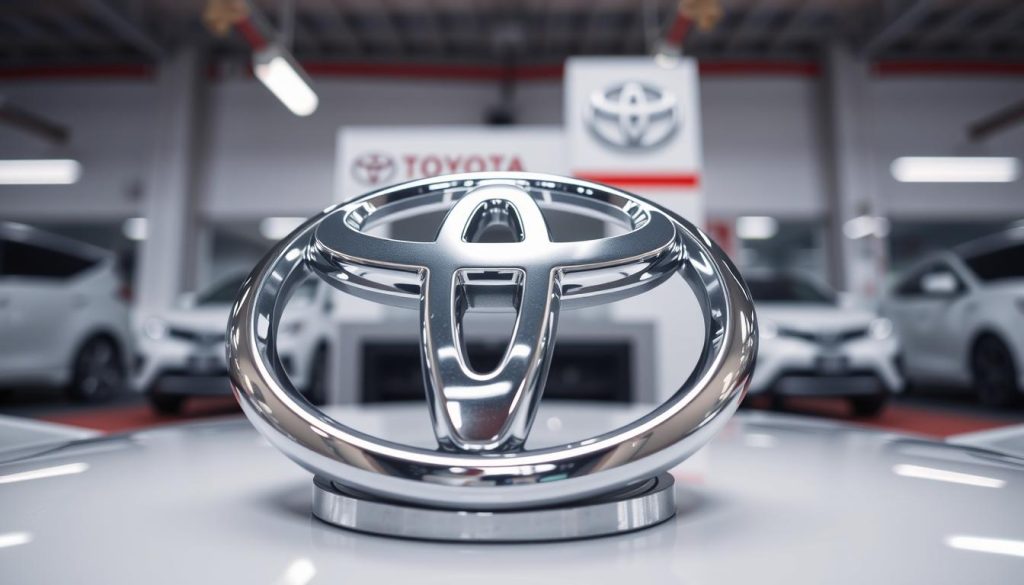
What’s Included in ToyotaCare
ToyotaCare is a prepaid maintenance plan. It includes routine services like oil changes and tire rotations. It also covers inspections for a set period or mileage, usually two years or 25,000 miles.
This plan helps budget for maintenance. It covers essential services. This way, owners can avoid unexpected expenses.
Some key benefits of ToyotaCare are:
- Factory-recommended maintenance
- 24-hour roadside assistance
- No-cost rental car
Is a Prepaid Maintenance Plan Worth It?
Whether ToyotaCare is worth it depends on several factors. Your driving habits and maintenance habits are key. For many Camry owners, the peace of mind and cost savings are worth it.
Consider your Camry maintenance cost history and future needs. If you drive normally and maintain your vehicle regularly, ToyotaCare is a good choice. But if you drive harshly or neglect maintenance, review the plan’s terms carefully.
Factors That Affect Your Camry’s Maintenance Budget
Keeping your Toyota Camry in top shape is more than just regular check-ups. Several things can affect how much you spend on maintenance. Knowing these can help you manage your budget better and keep your car running smoothly.
Driving Habits and Conditions
Your driving style and where you drive can really impact your Camry’s upkeep. City driving, for example, can wear out your car faster than driving on the highway. Driving aggressively, like speeding up and braking hard, puts extra stress on your car’s engine and brakes. This can mean higher costs for repairs and maintenance.
Climate and Environmental Factors
The weather and where you drive can also influence your Camry’s maintenance needs. Extreme temperatures can affect your car’s battery and engine. Driving in humid or salty areas can cause rust and corrosion, requiring more upkeep.
Original vs. Aftermarket Parts
When it’s time to replace parts, you can choose between OEM and aftermarket options.
Price Differences
OEM parts cost more but are made to fit perfectly and last longer. They meet the manufacturer’s exact standards.
Quality and Longevity Considerations
Aftermarket parts might be cheaper, but their quality can vary. Some are as good as OEM parts, while others may not last as long. It’s important to pick reputable brands to ensure you get quality parts.
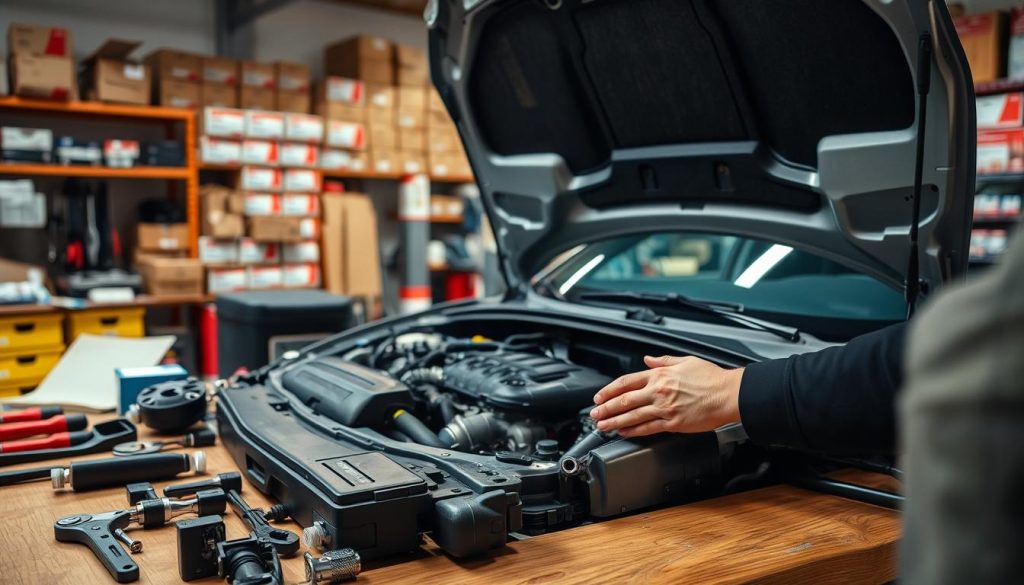
Comparing Camry Maintenance Cost to Competitors
When looking at midsize sedans, it’s smart to compare the Toyota Camry’s maintenance costs to others. The Camry is often compared to the Honda Accord and Nissan Altima. It’s also compared to luxury midsize sedans.

Camry vs. Honda Accord Maintenance
The Toyota Camry and Honda Accord have similar maintenance costs. Studies show both cars have about the same expenses for the first five years. The Accord might have a tiny advantage in repair costs, though.
On average, owners spend $4,000 to $5,000 on maintenance and repairs for both cars over five years.
Camry vs. Nissan Altima Upkeep
The Nissan Altima is another rival in the midsize sedan market. The Altima’s maintenance costs are similar to the Camry’s. But, some Altima models might have higher costs due to repair issues.
For example, some Altima models have CVT transmission problems. This can raise maintenance costs. Both the Camry and Altima have average yearly maintenance costs of $400 to $600.
Camry vs. Luxury Midsize Sedans
Comparing the Camry to luxury midsize sedans shows a big difference in maintenance costs. Luxury brands like Mercedes-Benz and BMW have higher costs. This is because they have more complex systems and use premium parts.
For instance, a Mercedes-Benz E-Class or a BMW 5-Series can cost much more to maintain. Their costs are often 50% or more higher than the Camry over five years.
Conclusion: Budgeting for Your Toyota Camry’s Lifetime Maintenance
Knowing the cost of maintaining a Toyota Camry is key for owners. It helps them plan their budget for their car’s upkeep. By looking at routine services, maintenance schedules, and common repairs, owners can cut down on costs.
When budgeting for a Camry’s life, think about both regular services and repairs. Understanding the costs helps owners make smart choices for their car. This way, their Camry will stay in top shape for many years.
Planning and staying on top of maintenance make owning a Camry affordable and reliable. Budgeting well for maintenance lets owners drive confidently. They know they’re ready for any costs that might come up.
FAQ
What is the average annual maintenance cost for a Toyota Camry?
The average annual maintenance for a Toyota Camry is about 0-0. This cost can change based on the model year, how you drive, and the weather.
How does the maintenance cost of a Toyota Camry compare to its competitors?
The Toyota Camry usually costs less to maintain than cars like the Honda Accord and Nissan Altima. Studies show it can save owners 0-0 a year.
What are the most common repairs for a Toyota Camry, and how much do they cost?
Common repairs include engine, transmission, and electrical system issues. Costs range from 0 to ,000 or more, depending on the problem.
Is it worth investing in an extended warranty for my Toyota Camry?
An extended warranty can offer peace of mind and protect against expensive repairs. But, it’s important to consider the costs and benefits. Think about the car’s age, mileage, and reliability.
Can I perform DIY maintenance tasks on my Toyota Camry to save money?
Yes, you can do simple tasks like oil changes and tire rotations yourself. Just make sure to follow the manual carefully to avoid damage or warranty issues.
How does the maintenance cost of a hybrid Toyota Camry compare to a conventional model?
Hybrid Camrys might cost more to maintain due to their complex systems. But, they can save on fuel and brake wear, making the cost comparison complex.
What factors can affect my Toyota Camry’s maintenance budget?
Your driving habits, the weather, and part choices can all affect maintenance costs. Aggressive driving, extreme temperatures, and aftermarket parts can increase expenses.
Should I choose original or aftermarket parts for my Toyota Camry’s maintenance?
Original parts are pricier but ensure quality and fit. Aftermarket parts are cheaper but may vary in quality and warranty. It’s important to consider both options carefully.
How often should I schedule maintenance for my Toyota Camry?
Follow the maintenance schedule in your owner’s manual. This is usually every 5,000 to 7,500 miles. Regular maintenance keeps your car in good shape and avoids expensive repairs.
Can I save money by using a prepaid maintenance plan for my Toyota Camry?
A prepaid maintenance plan can help budget for maintenance costs. It might save you money and prevent unexpected expenses. But, make sure the plan fits your needs.
